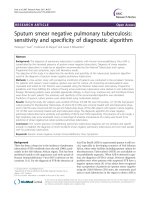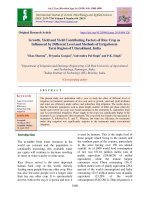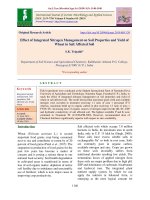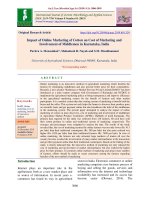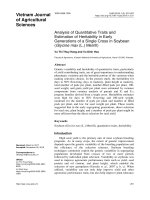Comparative sensitivity and specificity of various serological tests for detection of brucellosis in small ruminants
Bạn đang xem bản rút gọn của tài liệu. Xem và tải ngay bản đầy đủ của tài liệu tại đây (249.61 KB, 10 trang )
Int.J.Curr.Microbiol.App.Sci (2017) 6(5): 2090-2099
International Journal of Current Microbiology and Applied Sciences
ISSN: 2319-7706 Volume 6 Number 5 (2017) pp. 2090-2099
Journal homepage:
Original Research Article
/>
Comparative Sensitivity and Specificity of Various
Serological Tests for Detection of Brucellosis in Small Ruminants
R.R. Padher*, J.B. Nayak, M.N. Brahmbhatt and R.A. Mathakiya
Department of Veterinary Public Health, College of Veterinary Science and Animal Husbandry,
Anand Agricultural University, Anand, 388001, Gujarat, India
*Corresponding author
ABSTRACT
Keywords
Brucellosis,
Specificity,
Sensitivity,
Small ruminants
Article Info
Accepted:
19 April 2017
Available Online:
10 May 2017
Brucellosis is a zoonosis known to be a major public health hazard of great economic
importance globally. The present study was taken up to ascertain the seroprevalence of
brucellosis in goats, sheep, and humans of Anand, districts of the Central Gujarat region. A
total of 200 serum samples were collected from the goat and sheep of Anand district and
subjected to different serological test i.e., Rose Bengal Plate test (RBPT), Standard Tube
Agglutination Test (STAT) and Indirect ELISA to detect the Brucella antibody and also
compared in terms of their sensitivity and specificity. A total 200 sera sample including
100 from goats and 100 from sheep collected from the Anand district. Among 200 sera
samples of sheep and goats, 94 (47.00%) samples were found to be positive. 93 sera
samples were positive by I-ELISA, 27 by RBPT while 16 by STAT. One RBPT positive
goat serum sample was found to be negative by I-ELISA. Fifty six goat sera samples were
found to be sero-positive, out of which 55 samples were found to be positive by I-ELISA
while 16 by RBPT and 10 by STAT. Among 38 sera samples of sheep found to be positive
by I-ELISA while 11 by RBPT and 6 by STAT. In case of goats, the sensitivity of RBPT
and STAT was 27.27 and 18.18 per cent while specificity was 97.82 and 100 per cent,
respectively. An overall agreement of RBPT and STAT with I-ELISA was 66.00 and
55.00 per cent, respectively. Thus, sensitivity of RBPT was more than STAT but
specificity of RBPT and STAT was somewhat similar. In case of sheep, the sensitivity of
RBPT and STAT was 28.95 and 15.78 per cent while specificity was 100 per cent for both
test. An overall agreement of RBPT and STAT with I-ELISA was 73.00 and 68.00 per
cent, respectively. Thus, sensitivity of RBPT was more than STAT but specificity of
RBPT and STAT was similar.
Introduction
Brucellosis is one of the world’s major
diseases. It is neglected zoonoses (WHO,
2009) largely due to lack of public awareness
and especially in pastoral and mixed croplivestock farming systems (McDermott and
Arimi, 2002). Serological evidence suggest
that brucellosis is highly endemic in the most
part of India (Raju et al., 2004; Thavamathi,
2006; Valarmathy et al., 2007 and Singh et
al., 2013). Polding (1942) first reported the
isolation of B. melitensis from goat in India.
Subsequently, B. abortus was isolated from
cases of abortion in Haryana (Mathur,
1967).In small ruminants, most clinical
infection is manifested as fertility-related
issues. However, the most common symptoms
2090
Int.J.Curr.Microbiol.App.Sci (2017) 6(5): 2090-2099
are usually abortions during the trimester
including retained placenta, weak offspring
and metritis which may result in temporary
infertility. Others include drop in milk
production due to the infection of the udder.
Rams experience orchitis and epididymitis. In
addition, animals with polyarthritis have been
observed in endemic flocks (Radostits, Gay,
Hinchcliff,
&
Constable,
2006).
Seropravelance studies from the backbone of
epidemiology investigation and are used to
identify herd infected with Brucella
(Renukaradhya et al., 2002). The serological
tests include Rose Bengal Plate Test,
Complement
Fixation
Test,
Serum
Agglutination Test and Enzyme Linked
Immunosorbent Assay (ELISA) test (Pal,
2007). RBPT test has proven useful as a herd
screening test and is highly sensitive
(MacMillan, 1990).
Materials and Methods
The study was conducted to detect Brucella
antibodies for 200 sera samples comprising
goat sera (100) and sheep sera (100) collected
from various areas of Anand district, under
aseptic precautions. These sera samples were
tested for Brucella antibodies using RBPT,
STAT, and I-ELISA for detecting Brucella
antibodies from serum. Rose Bengal Plate
Test was carried out by using rose Bengal
plate test antigen. Using B.abortus
agglutinating antigen carried out standard
tube agglutination test. Both antigens were
procured from Indian Veterinary Research
Institute, Izatnagar. Indirect enzyme linked
immunosorbent assay was carried out by
using the smooth lipopolysaccharide (S-LPS)
I-ELISA kits (for sheep and goat sera)
procured from ICAR-National Institute of
Veterinary Epidemiology and Disease
Informatics (ICAR-NIVEDI) Bengaluru. The
samples were collected in vacutainer with
serum clot activator and transported to the
departmental P. G. research laboratory on
icebox for further processing and serological
analysis. The vacutainer was kept in upright
position at room temperature for about 2 hr.
Then the tubes were centrifuged at 3000 rpm
for 10 minutes to facilitate separation of
serum, which was collected in a screw capped
plastic vials. The sera were stored at -20ºC till
subjected to I-ELISA.
Results and Discussion
Overall seroprevalence of brucellosis in
small ruminants
Among 200 sera samples of sheep and goat
overall, 94 (47.00%) samples were found to
be positive for brucellosis. 27 (13.50%) sera
samples were positive by RBPT while 16
(8.00%) by STAT and 93 (46.50%) by IELISA, One RBPT positive goat serum
sample were found to be negative by IELISA. The seropositivity was the highest by
I-ELISA, intermediate by RBPT and lowest
by STAT (Table 1&2, Fig. 1)
Comparative efficacy of serological tests
Comparison of I-ELISA as compare to
RBPT and STAT
In the present study, overall seropositivity for
Brucella antibodies was detected by RBPT,
STAT and I-ELISA to compare their efficacy.
Total 200 serum samples comprising of 100
from goats and 100 from sheep, were tested
for the presence of Brucella antibodies by
RBPT, STAT and I-ELISA. Overall,
comparison to 46.50% of seropositivity in IELISA, 13.50% and 8.00% of the samples
were found seropositive by RBPT and STAT,
respectively. In goat, comparison to 55.00%
of seropositivity in I-ELISA, 16.00% and
10.00% of the samples were found
seropositive
by RBPT
and
STAT,
respectively while in sheep comparison to
38.00% of seropositivity in I-ELISA, 11.00%
2091
Int.J.Curr.Microbiol.App.Sci (2017) 6(5): 2090-2099
and 6.00% of the samples were found
seropositive
by RBPT
and
STAT,
respectively. Thus, I-ELISA detected highest
seroprevalence than RBPT and STAT and
RBPT detected more seroprevalence than
STAT in both goats and sheep.
Comparison of sensitivity and specificity of
I-ELISA, RBPT and STAT
Overall the sensitivity of RBPT and STAT
was 27.95% and 17.20%, respectively,
considering I-ELISA as a gold standard test
while specificity was 99.06% and 100%,
respectively. An overall agreement of RBPT
and STAT with I-ELISA was 66.00% and
61.50%, respectively (Table 4.8 and Figure
4.13). Thus, sensitivity of RBPT was more
than STAT but specificity of RBPT was little
less then STAT. Thus, RBPT was more
sensitive than STAT but specificity of both
tests was more or less similar. Hence, IELISA was a better serological test as
compared to RBPT and STAT and it could be
advocated for screening of small ruminants
(Table 3 and Fig 2).
In case of goat, the sensitivity of RBPT and
STAT was 27.27% and 18.18%, respectively,
considering I-ELISA as a gold standard test
while specificity was 97.82% and 100%,
respectively. Thus, sensitivity of RBPT was
more than STAT but specificity of RBPT and
STAT was somewhat similar. The overall
agreement of RBPT and STAT with I-ELISA
was 60.00% and 55.00%, respectively. Hence,
I-ELISA was a better serological test as
compared to RBPT and STAT and it could be
advocated for screening of goats (Table 4 and
Fig. 3).
In case of sheep, the sensitivity of RBPT and
STAT was 28.95% and 15.78%, respectively,
considering I-ELISA as a gold standard test
while specificity was 100% for both test.
Thus, sensitivity of RBPT was more than
STAT but specificity of RBPT and STAT was
similar. An overall agreement of RBPT and
STAT with I-ELISA was 73.00% and
68.00%, respectively. Hence, I-ELISA was a
better serological test as compared to RBPT
and STAT and it could be advocated for
screening of sheep (Table 5 and Fig. 4).
Overall seroprevalence of brucellosis in small
ruminants
In the present study, the overall
seroprevalence of brucellosis was 13.50%,
8.00% and 46.50% in small ruminants by
RBPT, STAT and I-ELISA, respectively
(Table 1&2, Fig. 1)
The finding of present study was similar with
the finding of Tegeg net al.,(2016)who
reported overallseroprevalencewas13% with
RBPT in small ruminants. Similar result was
also reported by Valarmathy et al., (2007)
which was 13.80% by RBPT and 8.28% by
STAT and Shadhu et al., (2015) who also
reported the seroprevalence of 11.30% and
11.10% by RBPT and STAT, respectively of
small ruminants in Banaskantha district. In
addition, Kumar et al., (2015) who found 7%
seroprevalence by STAT in animals in and
around Junagadh district of Gujarat state. In
addition, Din et al., (2013) who reported
13.33%, 11.33% and 9.33% by RBPT, SPAT
and STAT, respectively which was more or
less similar to the present study.
Comparative efficacy of serological tests
Overall, comparison to
46.50% of
seropositivity in I-ELISA, 13.50% and 8.00%
of the samples were found seropositive by
RBPT and STAT, respectively. In goat,
comparison to 55.00% of seropositivity in IELISA, 16.00% and 10.00% of the samples
were found seropositive by RBPT and STAT,
respectively while in sheep comparison to
38.00% of seropositivity in I-ELISA, 11.00%
and 6.00% of the samples were found
seropositive
by RBPT
and
STAT,
respectively.
2092
Int.J.Curr.Microbiol.App.Sci (2017) 6(5): 2090-2099
Table.1 Overall seroprevalence of brucellosis in small ruminants (sheep and goats)
Species Total number of sera tested
Goats
100
Sheep
100
Total
200
No. of positive sera samples
56
38
94
Percentage (%)
56.00%
38.00%
47.00%
Table.2 Overall sensitivity, specificity and agreement of RBPT and STAT by comparing with IELISA (Gold Standard Test) for detection of Brucella antibodies in goats
Serological Test
I-ELISA
Total Sensitivity Specificity Overall
(%)
Positive
Negative
15
1
16
Negative 40
45
85
Total
55
46
100
10
0
10
Negative 45
45
90
Total
45
100
RBPT Positive
STAT Positive
55
(%)
Agreement
(%)
27.27%
97.82%
60.00%
18.18%
100%
55.00%
Table.3 Overall sensitivity, specificity and agreement of RBPT and STAT by comparing with IELISA (Gold Standard Test) for detection of Brucella antibodies in small ruminants
Serological Test
I-ELISA
Positive
Total
Negative
Sensitivity
Specificity
Overall
(%)
(%)
Agreement
(%)
RBPT Positive
26
1
27
Negative
67
106
173
Total
93
107
200
16
0
16
Negative
77
107
184
Total
93
107
200
STAT Positive
2093
27.95%
99.06%
66.00%
17.20%
100%
61.50%
Int.J.Curr.Microbiol.App.Sci (2017) 6(5): 2090-2099
Table.4 Overall sensitivity, specificity and agreement of RBPT and STAT by comparing with IELISA (Gold Standard Test) for detection of Brucella antibodies in sheep
Serological Test
I-ELISA
Total
Sensitivity Specificity Overall
(%)
Positive
Negative
11
0
11
Negative
27
62
89
Total
38
62
100
6
0
6
Negative
32
62
94
Total
38
62
100
RBPT Positive
STAT Positive
(%)
Agreement
(%)
28.95%
100%
73.00%
15.78%
100%
68.00%
Figure.1 Overall test wise seroprevalence of brucellosis in small ruminants (sheep and goats)
2094
Int.J.Curr.Microbiol.App.Sci (2017) 6(5): 2090-2099
Figure.2 Overall sensitivity, specificity and agreement of RBPT and
STAT by comparing with I-ELISA
Figure.3 Overall sensitivity, specificity and agreement of RBPT and STAT by comparing with IELISA (gold standard test) for detection of Brucella antibodies in goats
2095
Int.J.Curr.Microbiol.App.Sci (2017) 6(5): 2090-2099
Figure.4 Overall sensitivity, specificity and agreement of RBPT and STAT by comparing with IELISA (gold standard test) for detection of Brucella antibodies in sheep
Table No. 2 Detection of Brucella antibodies by RBPT among goats and Sheep
Species Total number of sera tested Various serological methods
RBPT
STAT
I-ELISA
Goats
100
16 (16.00%) 10 (10.00%) 55 (55.00%)
Sheep
100
11 (11.00%) 6 (6.00%)
38 (38.00%)
Total
200
27 (13.50%) 16 (8.00%) 93 (46.50%)
In comparison to the present study similar
seroprevalence was obtained by Din et al.,
(2013) who found (11.33%) and (7.66%) with
RBPT and STAT, respectively in goats,
similarly, Kotadiya, (2012) who found higher
seropositivity of 11.38% by RBPT as
compared to 9.44% by STAT in sheep. In
addition Sonawaneet al., (2011) also observed
higher seroprevalence of 15.60% by I-ELISA
as compared to 5.92% by RBPT in sheep and
goat from Rajasthan.
In contrast, Rahman et al., (2011) in goats and
sheep who found highest seroprevalence of
brucellosis by RBPT followed by STAT and
I-ELISA. Shome et al., (2006) in sheep and
goats who found lower seropositivity of
7.36% by I-ELISA as compared to 9.95% by
RBPT from Rajasthan, Gujarat and
Karnataka. These variations may be due to the
ability of each test to detect different antibody
classes. The variation results of different tests
could be because of the various factors such
as stage of infection, presence of false
positive or negative animals and crossreacting organism beside many more.
Comparison of I-ELISA as compare to
RBPT and STAT
Overall sensitivity, specificity and agreement
of RBPT and STAT by comparing with I-
2096
Int.J.Curr.Microbiol.App.Sci (2017) 6(5): 2090-2099
ELISA (Gold Standard Test) for detection of
Brucella antibodies in small ruminants
Overall the sensitivity of RBPT and STAT
was 27.95% and 17.20%, respectively,
considering I-ELISA as a gold standard test
while specificity was 99.06% and 100%,
respectively. An overall agreement of RBPT
and STAT with I-ELISA was 66.00% and
61.50%, respectively (Table 3 and Figure 2).
Similar results was obtained by Tayshete,
(2001) who found specificity of RBPT and
STAT was 100 % but in contrast to present
study sensitivity of RBPT and STAT was
71.42% which was higher to present study,
considering I-ELISA as a gold standard test in
small ruminants. In addition Al-Gardia et al.,
(2011) who noted similar the specificity of
commercial RBPT was 99.06% but in contrast
to present study sensitivity of RBPT was
89.04% which was higher than present study.
In contrast, Coelho et al., (2008) who found
higher sensitivity 97.6% and lower specificity
77.6% values of RBT in small-ruminant.
Similarly Abdel-Khalek et al., (2012) who
recorded higher sensitivity 92.9% for RBT
and 90.7% for TAT while lower specificity
83% for RBT and 71.4% for TAT.
Overall sensitivity, specificity and agreement
of RBPT and STAT by comparing with IELISA for detection of Brucella antibodies in
goats
In case of goat, the sensitivity of RBPT and
STAT was 27.27% and 18.18%, respectively,
considering I-ELISA as a gold standard test
while specificity was 97.82% and 100%,
respectively. The overall agreement of RBPT
and STAT with I-ELISA was 60.00% and
55.00%, respectively (Table 4 and Fig.3)
Barbudhe et al., (1994) obtained lower the
relative sensitivity and similar specificity to
be of 42.85% and 100.00% for RBPT,
respectively and lower the relative sensitivity
and relative similar specificity to be of
28.57% and 94.17% for STAT in goats when
CFT was considered as gold standard test
which was somewhat similar with present
finding.
Sharma et al., (2006) recorded the sensitivity
(67.85%) which was higher than present study
and specificity (99.51%) which was similar to
present study of RBPT in goat of Mehsana
and Patan. district of Gujarat when compared
with dot-ELISA. Similarly Ekgatat et al.,
(2010) who found higher diagnostic
sensitivity (99.2%) which was higher than
present study and diagnostic specificity
(100%) which was similar to present study of
RBT in goat.
In addition Reddy et al., (2014) found higher
relative sensitivity (54.16%) of RBPT and
higher relative sensitivity (66.66%) of STAT
while similar specificity (100%) for both
tests, considering I-ELISA as a gold standard
test in goat of the Karnataka.
Overall sensitivity, specificity and agreement
of RBPT and STAT by comparing with IELISA for detection of Brucella antibodies in
sheep
In case of sheep, the sensitivity of RBPT and
STAT was 28.95% and 15.78%, respectively,
considering I-ELISA as a gold standard test
while specificity was 100% for both test.
Thus, sensitivity of RBPT was more than
STAT but specificity of RBPT and STAT was
similar. An overall agreement of RBPT and
STAT with I-ELISA was 73.00% and
68.00%, respectively (Table 5 and Fig. 4).
Hoverer, Kotadiya, (2012) who recorded
higher the sensitivity of RBPT (65.83%) and
STAT (62.02%) while similar the specificity
(100%) for both the tests, considering I-
2097
Int.J.Curr.Microbiol.App.Sci (2017) 6(5): 2090-2099
ELISA as a gold standard test in sheep
although found similar results that RBPT was
more sensitive than STAT but specificity was
similar for both tests.
In contrast, Kotadiya, (2012) in sheep, who
found overall agreement of RBPT and STAT
with I-ELISA were 93.78% and 91.25%,
respectively which was relative higher than
present study. Similarly, Shadhu et al., (2015)
who found overall agreement of RBPT and
STAT with I-ELISA was 92.50% and 92.30%
in small ruminants which was higher than
present study.
However in view of cost consideration,
feasibility and reliability as field diagnostic
test RBPT has been found to be much
cheaper, easier and convenient to perform
than ELISA.
Acknowledgement
The authors are highly thankful to the Dean,
College of Veterinary science and A.H.
Anand for financial assistance and research
facilities to conduct this research work and
also thankful to Dr. Snehal Patel Deputy
director of animal husbandry of Annand
districtfor kind support.
References
Abdel-Khalek, M., Ramadan, K., Hazem, S.,
and Khairy, E. 2012. Evaluation of
immunochromatographic
assay
for
serodiagnosis of Brucella among cattle,
sheep and goats in Egypt. Global Vet., 8:
511-518.
Al-Garadi, M.A., Khairani-Bejo, S., Zunita, Z.
and Omar, A.R. 2011. Detection of
Brucella melitensis in blood samples
collected from goats. J. Animal and Vet.
Adv., 10(11): 1437-1444.
Barbuddhe, S.B., Yadava, V.K. and Singh, D.K.
1994. Detection of IgM and IgG
antibodies against Brucella by dot-ELISA
in humans. The J. Communicable Dis.,
26(1): 1-5.
Din, A.M.U., Khan, S.A., Ahmad, I., Rind, R.,
Hussain, T., Shahid, M. and Ahmed, S.
2013. A study on the seroprevalence of
brucellosis in human and goat populations
of district Bhimber, Azad Jammu and
Kashmir. J. Anim. Plant Sci., 23(1): 113118.
Ekgatat, M., Kanitpun, R., Kunchit, P.,
Arampong, W., Raksajit, S., Thammasart,
S. and Wongkasemjit, S. 2010.
Comparison of serological tests for
antibody detection against Brucella
melitensis infection in goats. Kasetsart
Veterinarians, 20(1): 19-26.
Kotadiya, A.J. 2012. Serological, cultural and
molecular detection of Brucella infection
of sheep in Gujarat. M. V. Sc. thesis
submitted to SardarkrushinagarDantiwada
Agriculture
University,
Sardarkrushinagar, Gujarat.
Kumar, A.V., Srikanth, N.R., Naresh, G. and
Vidya, B. 2015. Assessment and
comparison of serum biochemical
parameters of Brucella infected and
healthy ewes. J. Livestock Sci., 6: 100103.
MacMillan,
A.A.
1990.
Conventional
serological tests. Animal brucellosis, 206:
153-197.
Mathur, T.N. 1967. Isolation of Brucella
abortusfrom goats and sheep in the
Punjab. Indian J. Vet. Sci., 37: 277-286.
McDermott, J.J. and Arimi, S.M. 2002.
Brucellosis in sub-Saharan Africa:
epidemiology, control and impact. Vet.
Microbiol., 90(1): 111-134.
Pal, M. 2007. Zoonoses. (2nd ed.) Satyan
Publishers, Jaipur, India. pp. 98-99.
Polding, J.B. 1942. Brucellosis in India. Ind. J.
Vet. Sci., 13: 27-34.
Radostits, O.M., Gay, C.C., Hinchcliff, K.W.
and Constable, P.D. (Eds.). 2006.
Veterinary Medicine: A textbook of the
diseases of cattle, horses, sheep, pigs and
goats. Elsevier Health Sciences.
Rahman, M.S., Faruk, M.O., Her, M., Kim,
J.Y., Kang, S. and Jung, S.C. 2011.
2098
Int.J.Curr.Microbiol.App.Sci (2017) 6(5): 2090-2099
Prevalence of brucellosis in ruminants in
Bangladesh. Veterinarni Medicina, 56(8):
379-385.
Raju, S., Kolhe, R.P., Raut, C., Shinde, S.V.
and
Zade,
N.N.
2004.
Seroepizootological studies on brucellosis in
goat and sheep. J. Vet. Public Health,
2(1/2):1-6.
Reddy, D.A., Kumari, G., Rajagunalan, S.,
Singh, D.K., Kumar, A. and Kumar, P.
2014.
Seroprevalence
of
caprine
brucellosis in Karnataka. Vet. World.
7(3): 182-188.
Renukaradhya, G.J., Isloor, S. and Rajasekhar,
M. 2002. Epidemiology, zoonotic aspects,
vaccination and control/eradication of
brucellosis in India. Vet. Microbiol.,
90(1): 183-195
Sadhu, D.B., Panchasara, H.H., Chauhan, H.C.,
Sutariya, D. R., Parmar, V. L. and
Prajapati, H. B. 2015. Seroprevalence and
comparison of different serological tests
for brucellosis detection in small
ruminants. Vet. World, 8(5): 561.
Sharma, V.K., Savalia, C.V., Selvam, D.T. and
Darekar, S. D. 2006. Seroprevalence of
caprine and ovine brucellosis in Mehsana
and Patan districts of Gujarat. Intas
Polivet, 7(2): 316-318.
Shome, R., Shome, B.R., Deivanai, M., Desai,
G.S., Patil, S.S., Bhure, S.K. and
Prabhudas, K. 2006. Seroprevalence of
brucellosis in small ruminants. Indian J.
Comp. Microbiol. Immunol. Infect. Dis.,
27(1): 13-15.
Singh, S.V., Chaubey, K.K., Gupta, S., Gupta,
V.K., Agrawal, N.D. and Kumar, N.
2013. Co-infection of Mycobacterium
avium subspecies paratuberculosisand
Brucella melitensis in a sirohi breed goats
in India. Adv. Anim. Vet. Ci., 1(6): 188190.
Sonawane, G.G., Tripathi, S., and Dubey, S.C.
2011. Sero-incidence of brucellosis in
small ruminants of semiarid Rajasthan.
Indian J. Animal Sci., 81(4): 327-29.
Tayshete, S.R. 2001. Seroprevalence of
brucellosis in North Gujarat. (M. V. Sc.
thesis submitted to S. D. A. University, S.
K. Nagar, Gujarat).
Tegegn, A.H., Feleke, A., Adugna, W. and
Melaku, S.K. 2016. Small ruminant
brucellosis and public health awareness in
two districts of Afar Region, Ethiopia. J.
Veterinar. Sci. Technol., 7(335): 2.
Thavamathi, A. 2006. Seroepidemiology of
Caprine Brucellosis and Evaluation of
Recombinant omp28 as a diagnostic
antigen. Thesis, M. V. Sc (Epidemiology)
submitted to Deemed University, Indian
Veterinary Research Institute, Izatnagar,
UP.
Valarmathy, K., Kumar, M., Singh, J.L. and
Ananda, B.V. 2007. Seroepidemiological
study of brucellosis in sheep and goats in
Uttarakhand. J. Vet. Public Health, 5(1):
45-47.
WHO. 2009. Integrated Control Of Neglected
Zoonotic Diseases In Africa: Applying
The "One Health Concept". WHO
Document Production Services, Geneva,
Switzerland. Epidemiology Records.
84(17): 147-148.
How to cite this article:
Padher, R.R., J.B. Nayak, M.N. Brahmbhatt and Mathakiya, R.A. 2017. Comparative Sensitivity
and Specificity of VariousSerological Tests for Detection of Brucellosis in Small Ruminants.
Int.J.Curr.Microbiol.App.Sci. 6(5): 2090-2099. doi: />
2099

